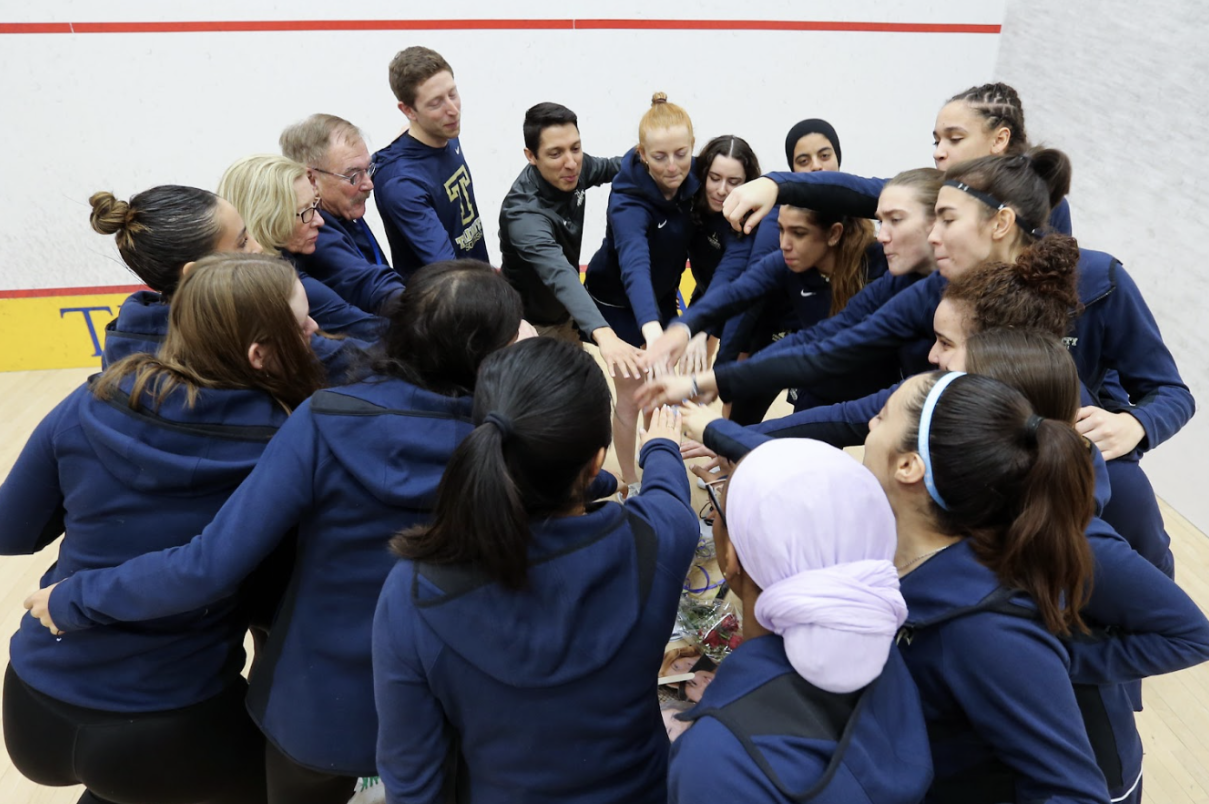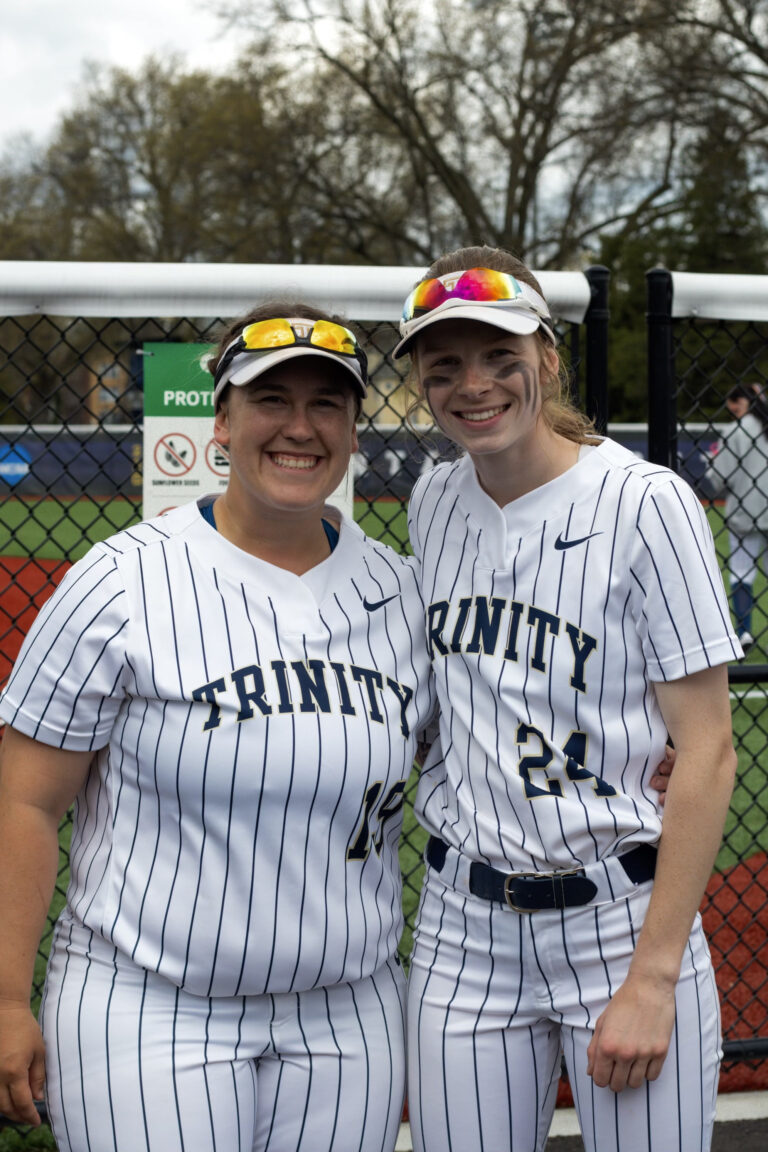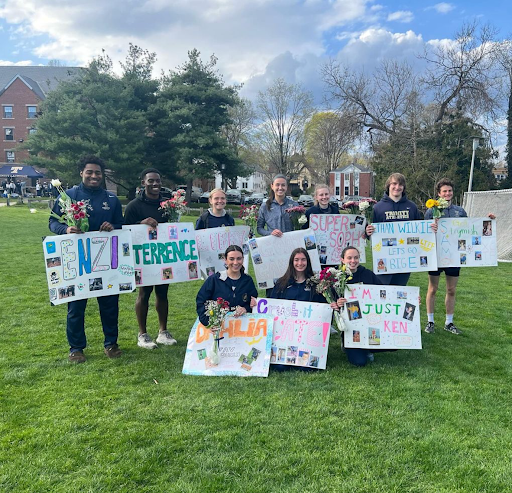Cece Hampton ’24
Sports Editor
In light of her recent recognition as the NESCAC Coach of the Year for the fifth time in her career, the Trinity Tripod sat down with the head coach of the women’s squash team, Wendy Bartlett. This past winter was Bartlett’s 39th season leading the Bantams, ending with a final record of 18-1 and earning their 16th NESCAC title. Bartlett attributes these successes to having an “incredible team,” with a culture that was strongly unified behind the same goal: winning the national championship. Each and every player went above and beyond their normal Monday through Friday practice schedule, putting more time into their fitness regimen on and off the courts. She says that the team fought through a lot of pain, between dealing with injuries and sacrificing free time, and developed the grit and determination to do all that it takes to win.
Since 1998, the squash team has increasingly welcomed more and more international players. Within the past 4 years, the team has become entirely made up of international players, with currently no one on the team having been born in the United States. Coach Bartlett says that when bringing in all of these international players who are top in their countries, the main objective is unifying them as a team playing for Trinity. As Trinity squash players, they must come together under the Bantam mascot and become a family. Bartlett explains that this begins with “the optics,” like having everyone wear Trinity gear rather than their national team gear; practicing the same techniques in the same ways; and encouraging team bonding like having meals together, spending time together outside of squash, and traveling together. When everyone is pushing themselves hard and have high expectations for themselves, the team as a whole is strengthened. Bartlett says that over winter break, when the team practices together twice per day, every day, they are essentially “in the trenches,” but this is when they are able to get the closest and really connect with each other.
The Bantams ultimately placed second in the College Squash Association Championship this past month, losing only to Harvard (5-4) in the finals. Despite this, Trinity is consistently ranked in the top three to five schools for squash nationwide each year. Time after time, they defeat other big-name Ivy league schools like Princeton and Yale, while also competing against other small NESCAC schools. Bartlett states, “It feels incredible. We are the only small team that’s able to go head-on-head and beat the Ivy’s. It’s just so rewarding. You have a lot of pride.” Trinity’s Bantam mascot speaks to this ability. Other schools like Princeton are the Tigers, and Yale are the Bulldogs, but Trinity is the Bantam, which might be the smallest animal in the barnyard, but it is the biggest in the fight. Assistant Coach Oscar Lopez-Hidalgo newly joined the Bantam family this season and spent a lot of time practicing and training with the players one-on-one. He said that before he came to this program, he saw that “this team has been in the top 3 nationally ranked schools for squash for the past 20 years with few exceptions, and this speaks to the great job that Coach Bartlett has done for her entire career.”
Bartlett began coaching at Trinity in 1984, overseeing both the women’s squash and tennis teams, heading both sports until just a few years ago when she switched to solely coaching squash. All her life, Bartlett played both tennis and squash. After graduating college she could not see herself working a typical desk job, so when the opportunity to coach at Trinity was presented to her, she jumped at it. Bartlett says, “It was my dream job. It still is my dream job.” Her favorite part of coaching is being with the student-athletes, and watching them grow and develop. She explains, “They come in as girls and graduate as women.”
When asked about her biggest inspiration, Bartlett stated that she admires other “female coaches that have really had to fight their way to be where they are, because certainly 39, 40 years ago, it wasn’t easy to be a female coach, especially being pregnant and being married. The whole lifestyle was tough and it took a lot of sacrifices.” When Title IX was passed, prohibiting discrimination on the basis of sex in any educational or activity programs, Bartlett was a freshman in college. Back then, there were virtually no opportunities for girls and women in sports. Bartlett says, “Today, I see how many more opportunities there are for girls compared to when I was young. I think athletics can teach you so much about discipline, setting goals, staying healthy, and teamwork. I really feel that athletics are so important to girls and women for developing life skills.”












[…] heavily advocates for women in sports, and stated in an interview with the Tripod last March that her biggest inspiration is other female coaches, because “[they] have really had to […]